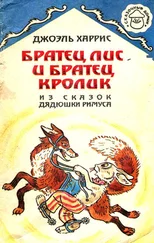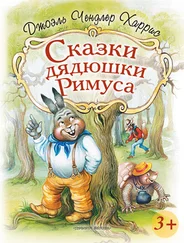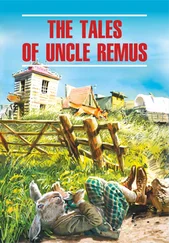Джоэль Харрис - Uncle Remus, his songs and his sayings
Здесь есть возможность читать онлайн «Джоэль Харрис - Uncle Remus, his songs and his sayings» весь текст электронной книги совершенно бесплатно (целиком полную версию без сокращений). В некоторых случаях можно слушать аудио, скачать через торрент в формате fb2 и присутствует краткое содержание. Год выпуска: 2000, Жанр: Сказка, Детские стихи, на английском языке. Описание произведения, (предисловие) а так же отзывы посетителей доступны на портале библиотеки ЛибКат.
- Название:Uncle Remus, his songs and his sayings
- Автор:
- Жанр:
- Год:2000
- ISBN:нет данных
- Рейтинг книги:3 / 5. Голосов: 1
-
Избранное:Добавить в избранное
- Отзывы:
-
Ваша оценка:
- 60
- 1
- 2
- 3
- 4
- 5
Uncle Remus, his songs and his sayings: краткое содержание, описание и аннотация
Предлагаем к чтению аннотацию, описание, краткое содержание или предисловие (зависит от того, что написал сам автор книги «Uncle Remus, his songs and his sayings»). Если вы не нашли необходимую информацию о книге — напишите в комментариях, мы постараемся отыскать её.
Uncle Remus, his songs and his sayings — читать онлайн бесплатно полную книгу (весь текст) целиком
Ниже представлен текст книги, разбитый по страницам. Система сохранения места последней прочитанной страницы, позволяет с удобством читать онлайн бесплатно книгу «Uncle Remus, his songs and his sayings», без необходимости каждый раз заново искать на чём Вы остановились. Поставьте закладку, и сможете в любой момент перейти на страницу, на которой закончили чтение.
Интервал:
Закладка:
"It's mighty col' wedder," said Brer John Henry, evidently wishing to change the subject.
"Col'!" exclaimed Uncle Remus; "hit got pas' col' on der quarter stretch. You oughter come to my house night 'fo' las'. Den you'd a foun' me 'live an' kickin'."
"How's dat?"
"Well, I tell you, Brer John Henry, de col' wuz so col', an' de kiver wuz so light, dat I thunk I'd make a raid on Mars John's shingle pile, an' out I goes an totes in a whole armful. Den I gits under de kiver an' tells my ole 'oman fer ter lay 'em onto me like she was roofin' a house. Bimeby she crawls in, an' de shingles w'at she put on her side fer ter kiver wid, dey all drap off on de flo'. Den up I gits an' piles 'em on agin, an' w'en I gits in bed my shingles draps off, an' dat's de way it wuz de whole blessid night. Fus' it wuz me up an' den de ole 'oman, an' it kep' us pow'ful warm, too, dat kinder exercise. Oh, you oughter drapt roun' 'bout dat time, Brer John Henry. You'd a year'd sho' nuff cussin'!"
"You don't tell me, Brer Remus!"
"My ole 'oman say de Ole Boy wouldn't a foun' a riper nigger, ef he wer' ter scour de country fum Ferginny ter de Alabam'"
XXI.
THE FOURTH OF JULY
UNCLE REMUS made his appearance recently with his right arm in a sling and his head bandaged to that extent that it looked like the stick made to accompany the Centennial bass-drum. The old man evidently expected an attack all around, for he was unusually quiet, and fumbled in his pockets in an embarrassed manner. He was not mistaken. The agricultural editor was the first to open fire:
"Well, you old villain! what have you been up to now?"
"It is really singular," remarked a commencement orator, "that not even an ordinary holiday—a holiday, it seems to me, that ought to arouse all the latent instincts of patriotism in the bosom of American citizens—can occur without embroiling some of our most valuable citizens. It is really singular to me that such a day should be devoted by a certain class of our population to broils and fisticuffs."
This final moral sentiment, which was altogether an impromptu utterance, and which was delivered with the air of one who addresses a vast but invisible audience of young ladies in white dresses and blue sashes, seemed to add to the embarrassment of Uncle Remus, and at the same time to make an explanation necessary.
"Dey ain't none er you young w'ite men never had no 'casion fer ter strike up wid one er deze Mobile niggers?" asked Uncle Remus. "'Kaze ef you iz, den you knows wharbouts de devilment come in. Show me a Mobile nigger," continued the old man, an I'll show you a nigger dat's marked for de chain-gang. Hit may be de fote er de fif' er July, er hit may be de twelf' er Jinawerry, but w'en a Mobile nigger gits in my naberhood right den an' dar trubble sails in an' 'gages bode fer de season. I speck I'm ez fon' er deze Nunited States ez de nex' man w'at knows dat de Buro is busted up; but long ez Remus kin stan' on his hin' legs no Mobile nigger can't flip inter dis town longer no Wes' P'int 'schushun an' boss 'roun' 'mong de cullud fokes. Dat's me, up an' down, an' I boun' dere's a nigger some'rs on de road dis blessid day dat's got dis put away in his 'membunce."
"How did he happen to get you down and maul you in this startling manner?" asked the commencement orator, with a tone of exaggerated sympathy in his voice.
"Maul who?" exclaimed Uncle Remus, indignantly. "Maul who? Boss, de nigger dat mauled me ain't bo'nded yit, an' dey er got ter have anudder war 'fo one is bo'nded."
"Well, what was the trouble?"
"Hit wuz sorter dis way, boss. I wuz stannin' down dere by Mars John Jeems's bank, chattin' wid Sis Tempy, w'ich I ain't seed 'er befo' now gwine on seven year, an' watchin' de folks trompin' by, w'en one er deze yer slick-lookin' niggers, wid a bee-gum hat an' a brass watch ez big ez de head uv a beerbar'l, come long an' bresh up agin me—so. Dere wuz two un um, an' dey went long gigglin' an' laffin' like a nes'ful er yaller-hammers. Bimeby dey come long agin an' de smart Ellick brush up by me once mo'. Den I say to myse'f, 'I lay I fetch you ef you gimme anudder invite.' An', sho' 'nuff, yer he come agin, an' dis time he rub a piece er watermillion rime under my lef' year."
"What did you do?"
"Me? I'm a mighty long-sufferin' nigger, but he hadn't no mo'n totch me 'fo' I flung dese yer bones in his face." Here Uncle Remus held up his damaged hand triumphantly. "I sorter sprained my han', boss, but dog my cats if I don't bleeve I spattered de nigger's eyeballs on de groun', and w'en he riz his count'nence look fresh like beef-haslett. I look mighty spindlin' an' puny now, don't I, boss?" inquired the old man, with great apparent earnestness.
"Rather."
"Well, you des oughter see me git my Affikin up. Dey useter call me er bad nigger long 'fo' de war, an hit looks like ter me dat I gits wuss an' wuss. Brer John Henry say dat I oughter subdue my rashfulness, an' I don't 'spute it, but tu'n a Mobile nigger loose in dis town, fote er July or no fote er July, an', me er him, one is got ter lan' in jail. Hit's proned inter me."
Примечания
1
Patrols. In the country districts, order was kept on the plantations at night by the knowledge that they were liable to be visited at any moment by the patrols. Hence a song current among the negroes, the chorus of which was:
"Run, nigger, run; patter-roller ketch you—
Run, nigger, run; hit's almos' day."
2
As a Northern friend suggests that this story may be somewhat obscure, it may be as well to state that the well is supposed to be supplied with a rope over a wheel, or pulley, with a bucket at each end.
3
1 It may he interesting to note here that in all probability the word "skedaddle," about which there was some controversy during the war, came from the Virginia negro's use of "skaddle," which is a corruption of "scatter." The matter, however, is hardly worth referring to.
4
An Atlanta friend heard this story in Florida, but an alligator was substituted for the fox, and a little boy for the rabbit. There is another version in which the impertinent gosling goes to tell the fox something her mother has said, and is caught; and there may be other versions. I have adhered to the middle Georgia version, which is characteristic enough. It may be well to state that there are different versions of all the stories—the shrewd narrators of the mythology of the old plantation adapting themselves with ready tact to the years, tastes, and expectations of their juvenile audiences.
5
Help; helped.
6
This story is popular on the coast and among the rice- plantations, and, since the publication of some of the animal-myths in the newspapers, I have received a version of it from a planter in southwest Georgia; but it seems to me to be an intruder among the genuine myth-stories of the negroes. It is a trifle too elaborate. Nevertheless, it is told upon the plantations with great gusto, and there are several versions in circulation.
7
In the days of slavery, the religious services held by the negroes who accompanied their owners to the camp-meetings were marvels of earnestness and devotion.
8
So far as I know, "Bango" is a meaningless term, introduced on account of its sonorous ruggedness.
9
The sword and belt in the constellation of Orion.
10
If these are adaptations from songs the negroes have caught from the whites, their origin is very remote. I have transcribed them literally, and I regard them as in the highest degree characteristic.
Читать дальшеИнтервал:
Закладка:
Похожие книги на «Uncle Remus, his songs and his sayings»
Представляем Вашему вниманию похожие книги на «Uncle Remus, his songs and his sayings» списком для выбора. Мы отобрали схожую по названию и смыслу литературу в надежде предоставить читателям больше вариантов отыскать новые, интересные, ещё непрочитанные произведения.
Обсуждение, отзывы о книге «Uncle Remus, his songs and his sayings» и просто собственные мнения читателей. Оставьте ваши комментарии, напишите, что Вы думаете о произведении, его смысле или главных героях. Укажите что конкретно понравилось, а что нет, и почему Вы так считаете.










